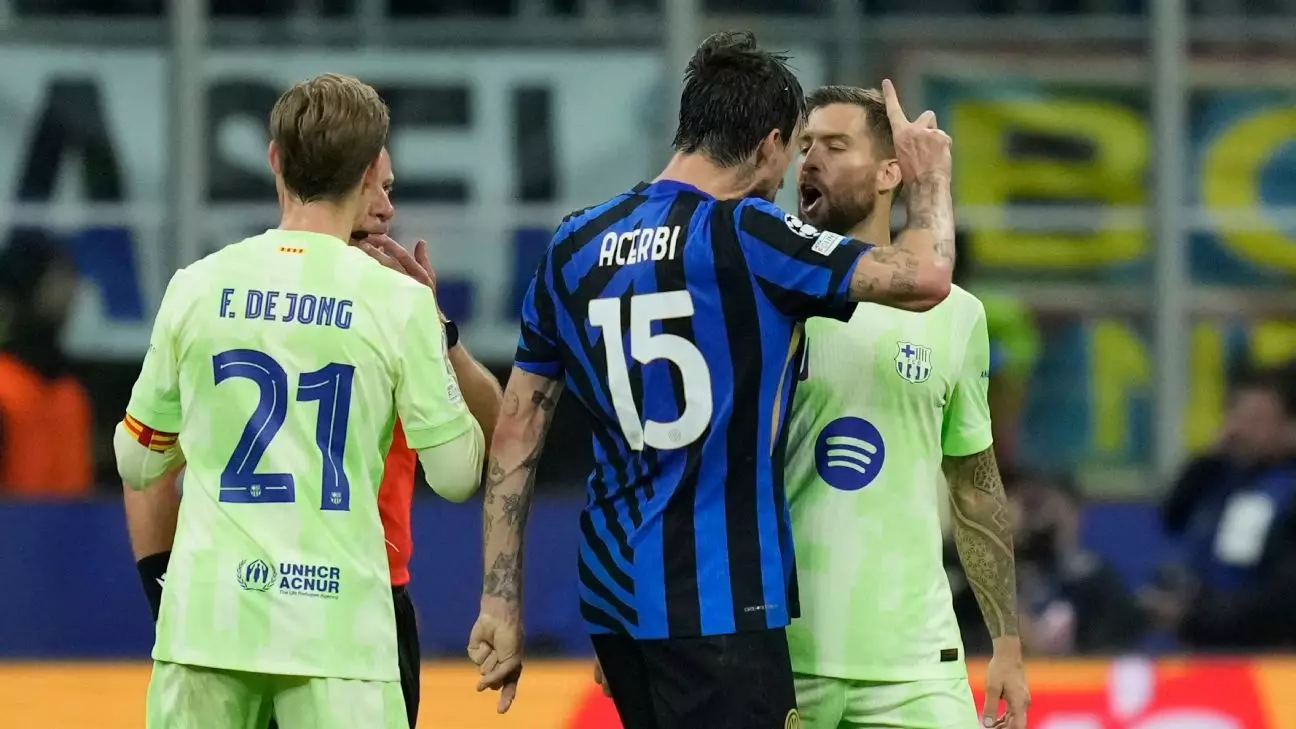In the heart of European football, the Champions League semifinal between FC Barcelona and Inter Milan delivered drama that transcended mere statistics. The match, an exhilarating contest that culminated in a 4-3 victory for Inter Milan after extra time, was a fierce battle enhanced by the intensity of emotions among players. Within this charged atmosphere, a particular incident between Barcelona’s Iñigo Martínez and Inter’s Francesco Acerbi escalated tensions, raising questions about sportsmanship and the thin line between competition and animosity.
The Flashpoint That Sparked Controversy
The moment in question unfolded just after Hakan Çalhanoğlu scored a penalty, prompting a celebratory sprint from Acerbi who, according to reports, directed a comment towards Martínez. The ensuing confrontation—primarily a reaction to Acerbi’s proximity—was marked by a rejected accusation of spitting, with Martínez vehemently denying any intent to disrespect his opponent. “My reaction to that was unnecessary, but at no moment have I aimed for him,” stated Martínez, underscoring the complexity of emotions on the pitch. The incident, seemingly minor in scale, became a focal point in a match filled with pivotal plays and shifting momentum.
VAR: The Invisible Arbiter
Despite the contentious nature of the encounter, neither the referee nor VAR deemed necessary the intervention for a potential red card or discipline against Martínez, which has since prompted grievances from the Barcelona camp. After the game, questions regarding officiating standards surged, with Barcelona’s midfielder, Pedri, advocating for UEFA to scrutinize the referee’s performance. Such grievances reveal an ever-growing concern in football about the inconsistency of officiating and the implementational issues surrounding VAR technology, which often fails to alleviate disputes but instead sows further dissatisfaction.
The Ripple Effect of the Incident
Beyond the flashpoint, Martínez’s erratic behavior prompted a tactical reshuffle by Barcelona, as he was substituted for Ronald Araújo—diminishing Barça’s defensive solidity at a crucial juncture. This reactive move became pivotal as Barcelona surged back from two goals down to lead 3-2. Inter’s resilience, however, was noteworthy, demonstrated not only in Acerbi’s late equalizer but also by goalkeeper Yann Sommer’s exceptional saves—a traditional hallmark of championship caliber.
Reflections on Sportsmanship and Rivalries
As the football world continues to dissect the events of this electrifying semifinal, the incident between Martínez and Acerbi raises broader questions regarding the nature of rivalry in sports. While passion and competitiveness lie at the heart of football, arguments around conduct on the pitch reveal the ongoing struggle to balance fierce competition with respect among players. The episode serves as a reminder that in a game celebrated for its beauty, the raw intensity can sometimes overshadow the spirit of fair play.
With Inter Milan now moving on to the final against either Paris Saint-Germain or Arsenal, this clash encapsulates the fierce emotions and stakes characteristic of high-level football, echoing the sentiment that in the world of elite sport, every interaction can reverberate well beyond the pitch.

